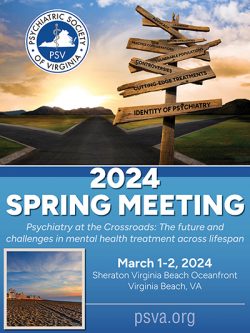By John P.D. Shemo, MD, DLFAPA
Medical Director
Psychiatric Alliance of the Blue Ridge
Associate Clinical Professor
University of Virginia
Charlottesville, VA
The 99th APA Assembly Meeting was held in Baltimore on November 3-5, 2023.
As usual, the Assembly addressed the passing of new or revised APA Position Statements developed by various components/committees and the every five-year retention or retirement of prior Position Statements. With Position Statements, the Assembly must pass them as written without revision, vote to not pass or retire them, or send them back to the component which had written them for revision.
Position Statements passed or retained including those addressing:
- Elder Abuse, Neglect, and Exploitation.
- Contingency Management for the Treatment of Stimulant Use Disorder.
- Opioid Overdose Evaluation and Naloxone Distribution.
- Harm Reduction.
- Housing, Homelessness, and Mental Health.
- The Appropriate Care of Pregnant and Newly-Delivered Women with Substance Abuse Disorders.
- Abortion, Family Planning, Legislative Intrusion in Reproductive Decisions.
- Abortion.
- Family Planning.
- Legislative Intrusion in Reproductive Choice.
- Peer Support Services.
- The Role of Psychiatrists in Reducing Physical Health Disparities in Patients with Mental Illness.
- Firearms Access: Inquiries in Clinical Settings.
- Utilization of Measurement Based Care.
- Augmented Intelligence in Clinical Practice and Research.
These recommendations by the Assembly will be sent to the Board of Trustees for final action.
The Assembly voted to refer a revised Position Statement on “Dangerous Patients” Exception to Psychotherapy-Patient Privilege in Criminal Court Proceedings.
The Assembly also voted to endorse the Practice Guideline on Treating Patients with Borderline Personality Disorder.
Fourteen Action Papers were also considered; Ten were approved either on Reference Committee consent calendars or after floor discussion.
Those passed included Action Papers which:
- Promoted guidelines for the prevention of patient assaults on mental health employees.
- Removal of exclusion of electroconvulsive treatment from Advanced Health Directives.
- Bring to fruition the commitment of the APA to its prior Action Paper “2021A2 12.0” toward making the carbon footprint of the APA annual meeting carbon neutral.
- Reduce access to lethal means: Restricting acetaminophen pack size.
- Addressing “carceral” psychiatry (“carceral” is a new term to designate correctional psychiatry and/or correctional medicine).
- Create equitable opportunities in APA Fellowship Programs for international medical graduates.
- Resident physician collective bargaining.
- Highlighting suicide among resident physicians, its risk factors and relevant recommendations.
- Ageism.
- Breaking Barriers: A Call to Action for APA to Prevent Discrimination Against Non-US International Medical Graduates.
- Opposition to the restriction and criminalization of appropriate psychotropic prescribing in nursing homes.
- Creating a resource guide to address gambling disorder in Asian-American and Pacific Islander (AAPI) communities.
- Continued in-person fall Assembly Meetings.
- Simplification of membership renewal.
- Increased trainee access to APA staff to improve recruitment and retention.
The four Action Papers not passed by the Assembly or withdrawn by the author included papers which:
- Addressed consideration of an APA-sponsored psychiatric comprehensive electric medical record.
- Addressed the mental health impacts of false information.
- Defining dangerous influences in the political process in American democracy.
- Addressing violations of the procedural code of the Assembly.
These papers withdrawn or not passed tended to be large vague topics which, if addressed at all, would probably best be addressed in a series of Action Papers.
The issue which was most addressed by the Assembly in this meeting related to the qualifications of the APA CEO and Medical Director which was introduced as an item of new business.
As most APA members are aware, Saul Levin, MD will be leaving his position as APA CEO and Medical Director and a search committee was established by the Board of Trustees to identify a replacement for that role. It came to the attention of the Assembly that this search committee had elected to “open the search” to not only non-psychiatrists, but to non-physicians. Members of the Assembly found this absolutely unacceptable and the resultant Action Paper states under “Be it Resolved” that “The APA Assembly representing members in 74 district branches, asserts that a necessary and essential qualification for the position of APA CEO and Medical Director in both the current and future searches is that the person be a physician who is licensed to practice medicine and has an at least initial board certification in psychiatry.”
This paper was passed on voice vote by the Assembly with no negative votes and one abstention by a member who felt she had a conflict of interest as she is a member of the CEO and Medical Director search committee. Because of the urgency of this issue, this Action Paper will be sent directly and immediately to the entire membership of the Board of Trustees and will not be referred first to the joint reference committee as would be the usual next step with most Action Papers.
While some in the Assembly may know, I personally was not able to get clarification as to who exactly had originally proposed that the Medical Director of the APA could be either a non-psychiatrist or even a non-physician.
We were told prior to the end of the meeting that there are no such candidates now being considered.
As always, Adam Kaul, Sherin Moideen, and I remain open to input from PSV members as to issues and concerns they would want addressed by the Assembly and/or the APA.




